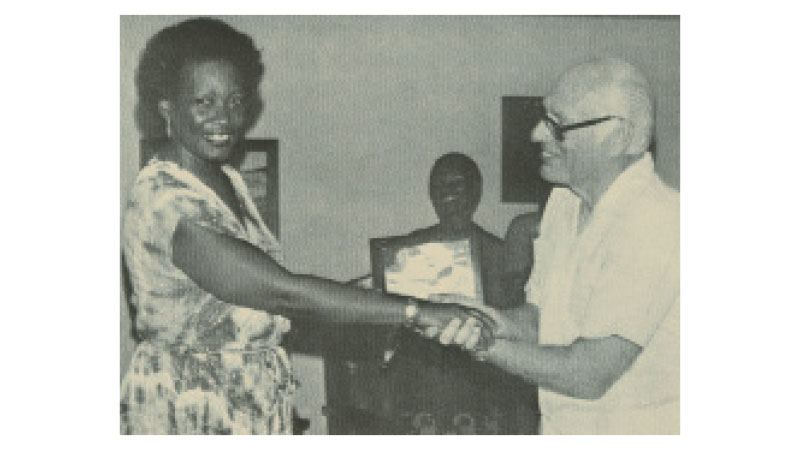By Mike Jarrett
Ina Nicholson filled a room when she walked in. Her presence dominated most gatherings and hers was a voice you heard at CSA meetings in the early 1980s. Ina Nicholson was head of the (now defunct) West Indies Shipping Corporation (WISCO) when I met her in 1983.
The daughter of a Tobago boat builder, Ina Nicholson was then chairman of WISCO. She was an adviser on shipping to the Trinidad and Tobago government and a well-known member of the CSA. Her first formal involvement in the maritime business was in 1969 when she joined the New York Port Authority as an economic analyst. She worked there for four years, up to the end of 1972, while doing graduate work in business administration at New York University.
Her family had started a small shipping company in Trinidad at about that time, so she left New York for home to help in setting up Niclan Company Limited. The name Niclan, she explained, was formed from the words “Nicholson” and “clan”. The shareholders were of course, members of her family.
“It was a successful venture, but in 1975, the first vessel we started with sank and my youngest brother died in that incident. It was the first death in the family,” she recalled.
Among other issues, Ina was concerned about the poor state of ships doing Caribbean service. These issues were later to come to the fore in the CSA and in the wider Caribbean in the work and dialogue leading to the establishment of a committee on port state control.
“Most schooners are not insured and their workers are not skilled. And so, when the vessels themselves are maintained below standards, there is easily a mishap. The cargo goes down and there is no insurance coverage and all that sort of thing,” Ina Nicholson lamented. “I think if WISCO could go into that, not necessarily taking bread from the small man in the schooner business, but offering a higher level of service, I think we would meet some greater needs for the CARICOM region.”
Nicholson was appointed the Trinidad and Tobago government’s shipping adviser in October 1979, a post she still held when we had our first discussion in 1983 at a CSA conference. In that discussion, I had commented that Caribbean governments were increasingly looking to establish national shipping lines. The Jamaican Government had already started the process with the registration and operation of Jamaica Merchant Marine.
“I don’t think they can do it successfully on their own. I think if we do find the need to cooperate as a region, the national shipping lines of Jamaica, Trinidad, Guyana, Barbados… and whoever… we can get together… to see what the movements of cargo from outside the region into the region and having WISCO trans-ship those cargoes internally. So I think the region would be better off in the sense that we would be participating in the movement of our own cargo to the region, and the spin-off would come to WISCO to have these cargoes trans-shipped.”
Speaking about her immediate goals Nicholson said, “Personally, I am interested in the implementation of the UNCTAD Code of Conduct for Liner Shipping. And I think it would be very difficult for that code to be implemented within the region on a national level. I think if we got together as a region, one can see the implementation being much easier because the code talks about the importing and exporting countries having 40% of cargoes and 20% to cross traders.”
About her interest in shipping Nicholson said, “Perhaps my interest in shipping is a latent interest because my father helped in building the first ship we had, a schooner, and then we branched off to big vessels.”
Born in the small fishing village of Charlotteville, Tobago, young Ina attended primary school on that small island before going to Trinidad for secondary education. After high school, she went on to New York University where she got a first degree in economics and then a Master’s degree in business administration. She subsequently did an international marketing course at Harvard Business School and later a shipping course at Cambridge University.
“However, I did work towards becoming a fellow of the Institute of Chartered Shipbrokers, and I am supposed to write a paper. The implementation of the code should be that paper but I have been so busy now getting our shipping policy together, you know, acquiring the vessels for coastal trade and assisting the development of shipping here that I haven’t in the last two years had any chance at all of thinking about writing this paper. As soon as I can, I see myself cutting out and going back to writing that paper to become a fellow of the Institute of Chartered Shipbrokers.”
Ina Nicholson was among the first women to walk the aisles of the Caribbean Shipping Association as a member of the Ship Owners and Ship Operators group. Under her leadership, the regional carrier WISCO made progress.

